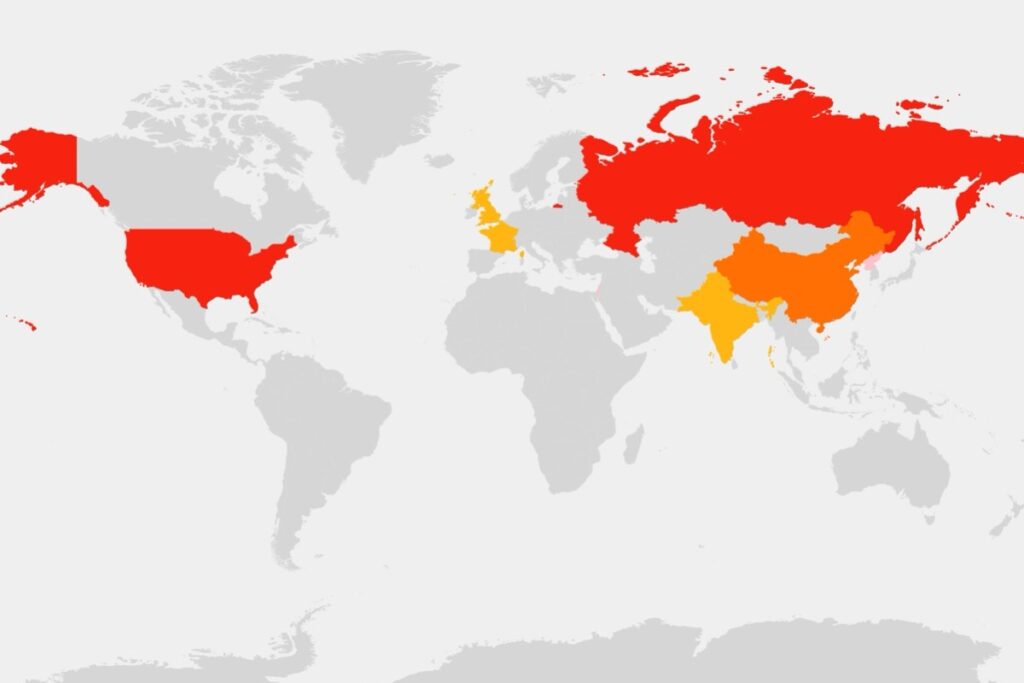China is developing nuclear warheads at a faster rate than any other country, as the East Asian nation significantly modernizes and expands its arsenal—making it the world’s third-largest nuclear power, behind Russia and the United States, a report by a Swedish think tank said.
When asked to comment, Chinese Foreign Ministry spokesperson Guo Jiakun said that China maintains its nuclear capabilities at a minimum level and implements a self-defensive nuclear strategy, adding that the country “never engages in an arms race.”
Newsweek has also reached out to the Chinese Defense Ministry for comment by email.
Why It Matters
China is one of nine nuclear-armed states. Besides Russia and the U.S., NATO allies France and the United Kingdom, along with India, Pakistan, North Korea and Israel—which does not publicly acknowledge possessing nuclear weapons—possess nuclear arsenals.
The report published by the Stockholm International Peace Research Institute comes against the backdrop of China’s military buildup—both conventional and nuclear. The Pentagon has warned that China could possess over 1,000 nuclear warheads by the end of the decade.
While Beijing has never disclosed the size of its nuclear arsenal, Chinese leader Xi Jinping last year ordered the acceleration of strategic deterrence force development, as the military conducted a rare test launch of a nuclear-capable intercontinental ballistic missile (ICBM).
What To Know
The Stockholm International Peace Research Institute released its annual assessment report on Monday, estimating that as of January, the total worldwide inventory of nuclear warheads stood at 12,241, of which approximately 9,614 were in military stockpiles for potential use by all nuclear powers, while the remaining 2,627 had been retired but not yet dismantled.
Russia, which possesses the world’s largest nuclear arsenal, has a total of 5,459 warheads, with 4,309 in its military stockpile. The U.S., by comparison, has an estimated 5,177 nuclear warheads in its inventory, of which 3,700 are either deployed or in storage.
China’s nuclear arsenal has expanded to at least 600 warheads—an increase of 100 in just one year. All of the warheads are considered ready for use, with 24 reportedly deployed.
While China is expected to continue expanding its nuclear stockpile over the coming decade, and the maximum projected number of its warheads by 2035 stands at 1,500, the report said this figure amounts to only about one-third of the current Russian and U.S. nuclear arsenals.
According to the report, the Chinese military can deliver its nuclear warheads using 20 H-6N bomber aircraft, 72 ballistic missiles launched from submarines, and a total of 712 land-based ballistic missiles of various types—launched either from silos or mobile platforms.
Regarding its ICBM force, which has an estimated range of over 3,410 miles, the report assessed that China “had completed or was close to completing” about 350 new ICBM silos across three desert fields in the north of the country and in three mountainous areas in the east.
China is refitting its Type 094 ballistic missile submarines (SSBNs) with longer-range missiles and developing both a new class of SSBN and a new type of nuclear-capable bomber aircraft, further enhancing the country’s nuclear triad, according to the report.
What People Are Saying
The Stockholm International Peace Research Institute wrote in its latest report on Chinese nuclear capabilities: “China’s standard posture since it developed nuclear weapons has been to keep warheads, missiles and launchers separate during peacetime, with procedures in place for loading warheads on to launchers in a crisis. However, there has been considerable speculation in recent years, which continued in 2024, about whether this remains the case.”
Guo Jiakun, spokesperson for the Chinese Foreign Ministry, said at a press conference on Monday: “China follows a policy of ‘no first use’ of nuclear weapons at any time and under any circumstances and has committed unconditionally to not using or threatening to use nuclear weapons against nonnuclear weapon states and nuclear-weapon-free zones.”
What Happens Next
Beijing has rejected Washington’s proposal for denuclearization talks, calling it “unfair and unrealistic.” The Stockholm International Peace Research Institute warned that arms control regimes have been severely weakened, fueling a dangerous new nuclear arms race.
Read the full article here

